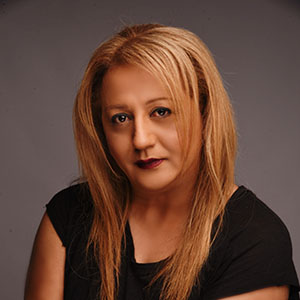
Anna Apergi-Konstantinidi
Country: Greece
Organization: Greek Transgender Support Association (GTSA)
Short CV
Anna Apergi-Konstantinidi, is the President of Greek Transgender Support Association (GTSA) and she has been member of civil society organizations for over of ten years.
She is a regular member of GTSA from 2012. From 2015 till 2016 she was regional secretary of GTSA and from 2017 till 2021 she was office director of GTSA. She is a certain member from GTSA to the Racist Violence Recording Network (RVRN) and also representative of GTSA to Recording Mechanism of National Committee for Human Rights (NCHR).
From March of 2022 till now she leads the presidency of GTSA and parallel she is certain member from LGBTQI+ organizations to NCHR and chair of the Section for the Advancement for Human Rights of NCHR.
From 1997 till 2000 she worked as a trainee catchpole at the Courts of First instance of Drama and Xanthi. She took part by the side of our dear departed president of GTSA, Marina Galanou, as representative at many boards of the Greek Parliament for instance for the voting of civil partnership, legal gender recognition and equal treatment. Also at November of 2022 she took part at the sittings of the Standing Committee of Public Administration, Civil Order and Justice for the processing and examination of the draft law for the Correctional Code of Ministry of the Citizens.
From 2016 she worked as an expert at issues of asylum for LGBTQI+ asylum seekers at the NGO Praksis and from 2018 she became a member of the Scientific Workgroup of Health Ministry with object the full accession of transgender and intersex persons at health.
From 2020 till 2021 she worked as trainer at the University Program of Aegean University with title: “Gestalt Affirmative LGBTQI+-Counceling for sexual diversity and gender identities”.
Round-table discussion
(together with: Parvy Palmou & George Kesisoglou & Chloe Kolyri & Pavlos Zarogiannis)
Title: Gender, identity, and sexuality as multiplicities: heteroglossia and polyphony
It seems that, in recent years, what Aristotle once formulated is increasingly accepted, namely that “it seems impossible for all things to be one” and that ultimately the “one… is many”. This notion seems almost self-evident, if one considers, even for a moment, the diversity of all living beings, humans included. It is a notion that could lead to a horizontal distribution, mutual recognition, and equal acceptance of all living beings.
And yet: the one may be many, but the many were sacrificed, and continue to be sacrificed, in the name of the one. Because what has prevailed and what has been imposed for centuries is categorization, grouping, and homogenization, as well as the vertical hierarchy of homogenized categories and groups, something that led, and still leads, to prohibitions, marginalization, exclusions, and conditional inclusions with painful, traumatic, and sometimes tragic consequences for those who belong to the arbitrarily and pejoratively called “minority” groups.
Maybe now is the time to remember Aristotle’s saying about the multiplicity of beings and to reflect on their heteroglossia and polyphony. And, of course, it is also a time for us to contemplate the depth and implications of this saying at all levels of our psychotherapeutic practice. And this not only in relation to our patients, but also to us as therapists.

